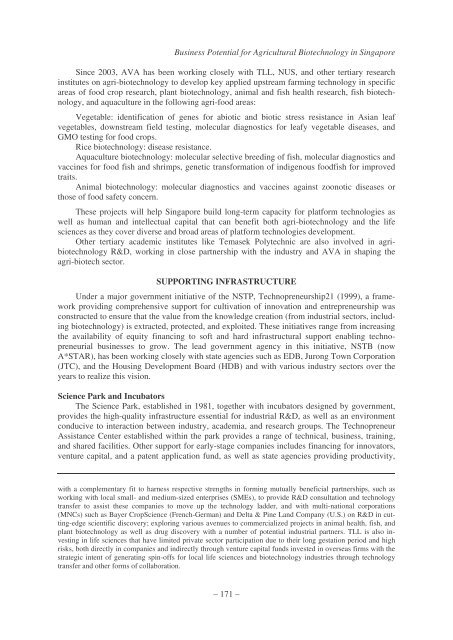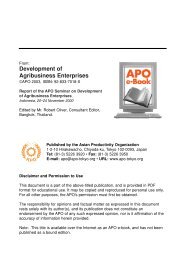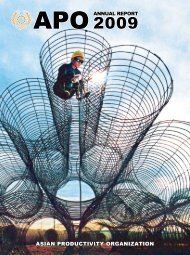Business Potential for Agricultural Biotechnology - Asian Productivity ...
Business Potential for Agricultural Biotechnology - Asian Productivity ...
Business Potential for Agricultural Biotechnology - Asian Productivity ...
You also want an ePaper? Increase the reach of your titles
YUMPU automatically turns print PDFs into web optimized ePapers that Google loves.
<strong>Business</strong> <strong>Potential</strong> <strong>for</strong> <strong>Agricultural</strong> <strong>Biotechnology</strong> in Singapore<br />
Since 2003, AVA has been working closely with TLL, NUS, and other tertiary research<br />
institutes on agri-biotechnology to develop key applied upstream farming technology in specific<br />
areas of food crop research, plant biotechnology, animal and fish health research, fish biotechnology,<br />
and aquaculture in the following agri-food areas:<br />
Vegetable: identification of genes <strong>for</strong> abiotic and biotic stress resistance in <strong>Asian</strong> leaf<br />
vegetables, downstream field testing, molecular diagnostics <strong>for</strong> leafy vegetable diseases, and<br />
GMO testing <strong>for</strong> food crops.<br />
Rice biotechnology: disease resistance.<br />
Aquaculture biotechnology: molecular selective breeding of fish, molecular diagnostics and<br />
vaccines <strong>for</strong> food fish and shrimps, genetic trans<strong>for</strong>mation of indigenous foodfish <strong>for</strong> improved<br />
traits.<br />
Animal biotechnology: molecular diagnostics and vaccines against zoonotic diseases or<br />
those of food safety concern.<br />
These projects will help Singapore build long-term capacity <strong>for</strong> plat<strong>for</strong>m technologies as<br />
well as human and intellectual capital that can benefit both agri-biotechnology and the life<br />
sciences as they cover diverse and broad areas of plat<strong>for</strong>m technologies development.<br />
Other tertiary academic institutes like Temasek Polytechnic are also involved in agribiotechnology<br />
R&D, working in close partnership with the industry and AVA in shaping the<br />
agri-biotech sector.<br />
SUPPORTING INFRASTRUCTURE<br />
Under a major government initiative of the NSTP, Technopreneurship21 (1999), a framework<br />
providing comprehensive support <strong>for</strong> cultivation of innovation and entrepreneurship was<br />
constructed to ensure that the value from the knowledge creation (from industrial sectors, including<br />
biotechnology) is extracted, protected, and exploited. These initiatives range from increasing<br />
the availability of equity financing to soft and hard infrastructural support enabling technopreneurial<br />
businesses to grow. The lead government agency in this initiative, NSTB (now<br />
A*STAR), has been working closely with state agencies such as EDB, Jurong Town Corporation<br />
(JTC), and the Housing Development Board (HDB) and with various industry sectors over the<br />
years to realize this vision.<br />
Science Park and Incubators<br />
The Science Park, established in 1981, together with incubators designed by government,<br />
provides the high-quality infrastructure essential <strong>for</strong> industrial R&D, as well as an environment<br />
conducive to interaction between industry, academia, and research groups. The Technopreneur<br />
Assistance Center established within the park provides a range of technical, business, training,<br />
and shared facilities. Other support <strong>for</strong> early-stage companies includes financing <strong>for</strong> innovators,<br />
venture capital, and a patent application fund, as well as state agencies providing productivity,<br />
with a complementary fit to harness respective strengths in <strong>for</strong>ming mutually beneficial partnerships, such as<br />
working with local small- and medium-sized enterprises (SMEs), to provide R&D consultation and technology<br />
transfer to assist these companies to move up the technology ladder, and with multi-national corporations<br />
(MNCs) such as Bayer CropScience (French-German) and Delta & Pine Land Company (U.S.) on R&D in cutting-edge<br />
scientific discovery; exploring various avenues to commercialized projects in animal health, fish, and<br />
plant biotechnology as well as drug discovery with a number of potential industrial partners. TLL is also investing<br />
in life sciences that have limited private sector participation due to their long gestation period and high<br />
risks, both directly in companies and indirectly through venture capital funds invested in overseas firms with the<br />
strategic intent of generating spin-offs <strong>for</strong> local life sciences and biotechnology industries through technology<br />
transfer and other <strong>for</strong>ms of collaboration.<br />
– 171 –
















